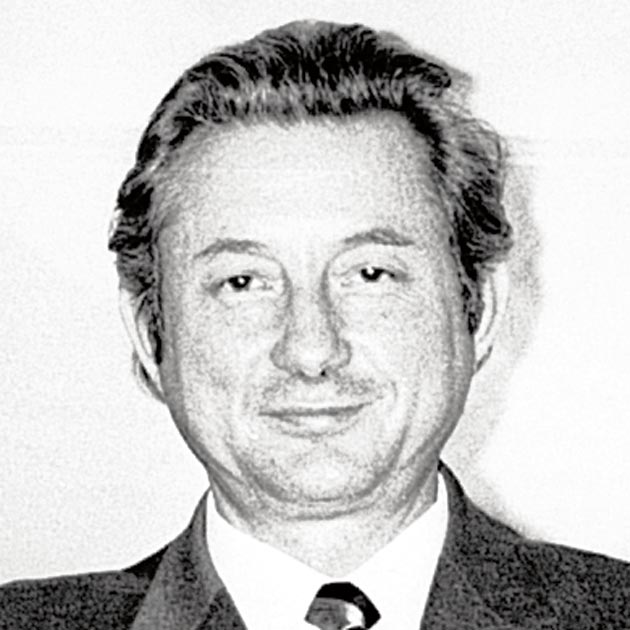Theo Albrecht: One of the two brothers behind the Aldi supermarket empire

A former Afrika Korps soldier, Theo Albrecht was the German entrepreneur behind the discount store Aldi.
Survivor of a bizarre kidnapping, and a noted recluse, with his his brother Karl he turned their mother's corner shop into the no-frills Aldi Empire, which extends to over 8,000 stores worldwide and placed the brothers in Forbes's rich list, with a combined fortune of over $40bn in 2010, exceeded only by those of Bill Gates, Warren Buffett and the Mexican Carlos Slim.
The key to Aldi's success has been its devotion to cost-cutting, allowing it to sell a limited assortment of goods at bargain prices with minimal advertising costs. Aldi's thrifty ways are a reflection of its founders' personalities with neither brother flaunting his wealth; at board meetings Theo was renowned for taking notes with pencil stubs rather than an executive fountain pen. Nevertheless, in 2009, the brothers' businesses had estimated global sales of over €50bn. The companies, which are privately held, do not release financial information.
Born in Schonnebeck, a suburb of Essen in the industrial Ruhr region of Germany in 1922, Theodor Paul Albrecht was two years younger than his brother Karl. Their father, a miner, became ill with emphysema, which was the catalyst for their mother to open a corner shop in the 1930s in order to bring in money. Theo stayed with his mother and learned the grocery trade, while Karl trained at a delicatessen. With the outbreak of the Second World War, both served in the Wehrmacht. Karl was wounded on the Eastern Front; Theo served in Rommel's Afrika Korps until he was captured by US troops in Tunisia in 1945.
Upon their release from prisoner-of-war camps the two brothers returned to a decimated city; Krupps munitions plants had been located there. Their mother's shop, however, remained intact. They took it over and quickly expanded, opening shops that, out of necessity, sold only a small number of essential items, while experimenting with a no-frills self-service format. The goods were not displayed on shelves but in cardboard boxes stacked on wooden pallets. Within a decade, as Germany's economic recovery gathered pace, they owned more than 100 stores. By 1961 the retail chain was formally given the name Aldi, a contraction of "Albrecht discount".
Aldi stuck to its motto of "best quality, lowest price". Its operations were run with military discipline and attention to detail, and in such secrecy that Aldi managers were forbidden not only to talk to the press but even to colleagues in other districts. The company grew to become a global phenomenon by spending almost nothing on advertising and by simplifying its inventory, stocking only a fraction of products featured in regular supermarkets. Customers pay extra for plastic bags in which they pack their own groceries, which keeps staff numbers down. The stores are generally small and spartan, and to maximise efficiency often have unlisted telephone numbers so employees are not interrupted. The German stores were so dominant that not even the US discount giant Walmart could compete, and withdrew from Germany in 2006. In 1961 the brothers divided their company into two operations within Germany, Theo running Aldi Nord, and Karl Aldi Süd. As the brand continued to grow, the brothers divvied up the globe, with Theo taking the rights to Europe and Karl taking the US, the UK – where there are over 300 stores – and Australia.
In 1979, Theo broke into the US and bought Trader Joe's, a young California grocery chain featuring Hawaiian shirt-wearing employees, inexpensive "gourmet" foods and a cost-cutting ethic that mirrored Aldi's. Since then, Trader Joe's, known for its lively atmosphere, has developed a fanatical following among customers as it expanded to more than 340 stores in over 25 states, generating sales of $8bn last year.
Little is known about the Albrecht family except their obsession with privacy; they live behind fortress-like security on estates overlooking the Ruhr valley, maintaining an almost total media black-out. Their reputation for reclusiveness is part of German business folklore. There are only a handful of photographs of the brothers in existence. Forbes magazine once described Theo as "more reclusive than the Yeti".
Their seclusion became even more pronounced after 1971 following Theo's kidnapping on the way home from work. His assailants, a lawyer with gambling debts and a convicted burglar, disbelieving that the common-looking man dressed in an ill-fitting, off-the-rack suit could be their target, demanded to see his identification. He was held for 17 days and paid the equivalent of £2.2m for his release. However, it later emerged that the ever-frugal Theo had negotiated the ransom. He demanded, and won, tax relief on the payment, claiming it was a business expense. Thereafter, he never spoke to the media again and went to great lengths to avoid being photographed.
By all accounts Theo had not been involved in the day-to-day management of Aldi since 1993 and had transferred his assets to a foundation, although he remained chairman.
Theodor Paul Albrecht, entrepreneur: born Essen, Germany 28 March 1922; married Cilli (two sons); died Essen 24 July 2010.
Join our commenting forum
Join thought-provoking conversations, follow other Independent readers and see their replies
Comments